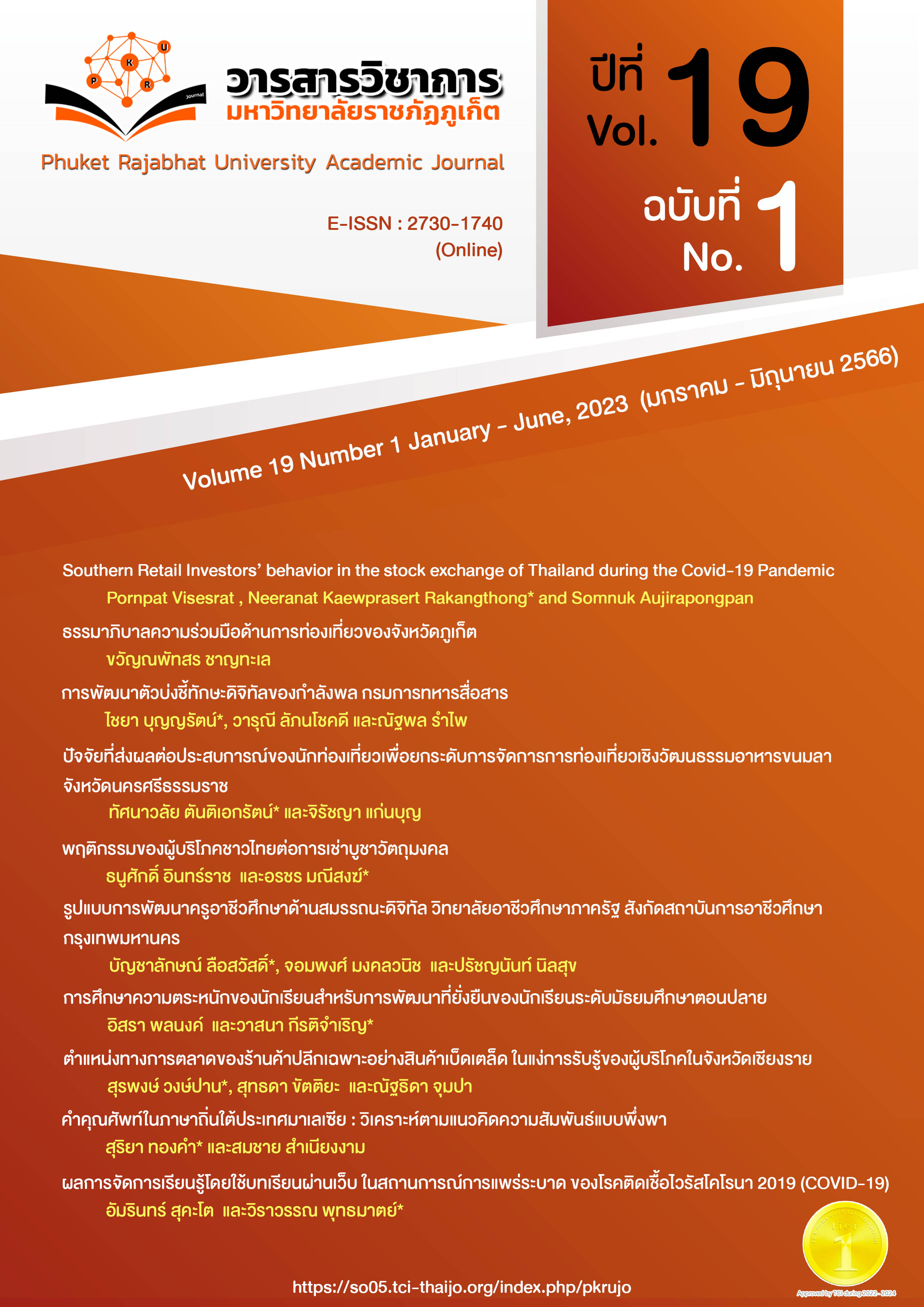ธรรมาภิบาลความร่วมมือด้านการท่องเที่ยวของจังหวัดภูเก็ต
Main Article Content
บทคัดย่อ
การวิจัยครั้งนี้มีวัตถุประสงค์เพื่อ 1) เพื่อศึกษาสภาพธรรมาภิบาลความร่วมมือด้านการท่องเที่ยวของจังหวัดภูเก็ต 2) เพื่อศึกษาปัจจัยที่มีผลต่อการส่งเสริมการพัฒนาธรรมภิบาลความร่วมมือด้านการท่องเที่ยวของจังหวัดภูเก็ตและ 3) เพื่อนำเสนอรูปแบบธรรมาภิบาลความร่วมมือด้านการท่องเที่ยวของจังหวัดภูเก็ต เป็นการวิจัยเชิงคุณภาพ เก็บรวบรวมข้อมูลโดยการศึกษาเอกสาร การสัมภาษณ์เชิงลึก การสนทนากลุ่มและการวิเคราะห์ข้อมูล ได้แก่ การลดทอนข้อมูล การตรวจสอบ การนำเสนอข้อมูลและข้อสรุป ผลการวิจัยพบว่า 1) สภาพธรรมาภิบาลความร่วมมือด้านการท่องเที่ยวของจังหวัดภูเก็ตยังไม่มีการนำธรรมาภิบาลมาใช้กำกับดูแลด้านการท่องเที่ยวให้เป็นรูปธรรม 2) ปัจจัยที่มีผลส่งเสริมต่อส่งการพัฒนาธรรมภิบาลความร่วมมือด้านการท่องเที่ยวของจังหวัดภูเก็ต ได้แก่ ) นโยบายภาครัฐที่ส่งเสริมธรรมาภิบาล 2) การมีส่วนร่วม 3) การรับรู้ข่าวสารและการประชาสัมพันธ์ 4 ) กฎหมายข้อบังคับ 5) สิ่งอำนวยความสะดวก 6) การเข้าถึงแหล่งท่องเที่ยว และ 3) รูปแบบธรรมาภิบาลความร่วมมือด้านการท่องเที่ยวของจังหวัดภูเก็ต โดยใช้ PHUGET Model ประกอบด้วย 6 ด้าน P แทนคำว่า Public participatory หมายถึง การมีส่วนร่วมของภาครัฐ ภาคเอกชนและภาคประชาชน H แทนคำว่า Hospitality หมายถึง การปลูกฝังสร้างจิตสำนึกให้ผู้คนให้การต้อนรับต่อแขกอย่างเป็นมิตร U แทนคำว่า Unity หมายถึง การมีเอกภาพในการจัดการการท่องเที่ยว G แทนคำว่า Regulation Guillotine หมายถึง การปรับปรุงกฎระเบียบที่ให้เหมาะและมี “ธรรมนูญของท้องถิ่น” E แทนคำว่า Education หมายถึง การพัฒนาการเรียนรู้และ T แทนคำว่า Technology หมายถึง การใช้เทคโนโลยีเข้ามาจัดการเก็บรวบรวมเป็น Big data เพื่อเป็นตัววิเคราะห์ในการวางแผนและตัดสินใจ เพื่อเพิ่มประสิทธิภาพและประสิทธิผลของธรรมาภิบาลความร่วมมือด้านการท่องเที่ยวของจังหวัดภูเก็ต
Article Details

อนุญาตภายใต้เงื่อนไข Creative Commons Attribution-NonCommercial-NoDerivatives 4.0 International License.
เนื้อหาและข้อมูลในบทความที่ลงตีพิมพ์ในวารสารวิชาการมหาวิทยาลัยราชภัฏภูเก็ต ถือเป็นข้อคิดเห็นและความรับผิดชอบของผู้เขียนบทความโดยตรง ซึ่งกองบรรณาธิการวารสารฯ ไม่จำเป็นต้องเห็นด้วยหรือร่วมรับผิดชอบใด ๆ
บทความ ข้อมูล เนื้อหา รูปภาพ ฯลฯ ที่ได้รับการตีพิมพ์ในวารสารวิชาการมหาวิทยาลัยราชภัฏภูเก็ต ถือเป็นลิขสิทธิ์ของวารสารวิชาการมหาวิทยาลัยราชภัฏภูเก็ต หากบุคคลหรือหน่วยงานใดต้องการนำทั้งหมดหรือส่วนหนึ่งส่วนใดไปเผยแพร่ต่อหรือเพื่อกระทำการใด ๆ จะต้องได้รับอนุญาตเป็นลายลักษณ์อักษรจากวารสารวิชาการมหาวิทยาลัยราชภัฏภูเก็ตก่อนเท่านั้น
เอกสารอ้างอิง
Ansell, A. & Gash, A. (2008). Collaborative governance in theory and practice. https://shorturl. asia/UcKem
Appleby, P. (1965). Public administration and democracy; essays in honor. (Appleby, P & Martin, R.C. editor.) Syracuse University Press.
Boonanon, R. et al. (2014). The form of the promoting activities held by Kamphaeng-Phet historical park, World Heritage Site. https://shorturl.asia/UcKem
Creighton, J.L. (2000). The public participation handbook: making better decisions through citizen involvement. King Prajadhipok's Institute and Asia Foundation.
Hiranto, U. (1980). Local administration. Odeon Store.
KPI. (2005). Research report. Expansion project to bring indicators of good governance practice in to Enterprise Level. King Prajadhipok's Institute.
Laothammathat, A. (2009). Transmigration: creating local government as the foundation of democracy. Thammasat University.
Lertpaithoon, S. et al. (2019). A Study in methods for administering and developing Koh Samui. Journal of Humanities and Social Sciences 11(2), 1–56.
MPS, MTS. (2016). Annual report 2016, Ministry of Tourism and Sports. Ministry of Tourism and Sports.
OPSDC. (2011). The problem of budget allocation is inconsistent with the economic growth and income collection of Phuket Province. OPSDC
Rakkwamsuk, E. (2014). Roles of citizens in good governance: the case study of registration of land title deed of Wat Don Sawan (unoccupied). Western University.
Sinaga, I.C. (2021). Collaborative governance in tourism development in Indonesia: study of south sumatera Province. https://shorturl.asia/AHdVb
Tetanang, C. & Suksom, S. (2022) Managerial effectiveness of bangkok mass transit authority (BMTA). Journal of Social Science and Buddhistic Anthropology. 5(4), 1-15
Ullah, I & Kim, D.Y. (2019). A Model of Collaborative Governance for Community-based trophy-Hunting programs in developing countries. https://shorturl.asia/hJKA9
WTO and Griffith University. (2017). Managing growth and sustainable tourism governance in Asia and the Pacific. UNWTO publication.


